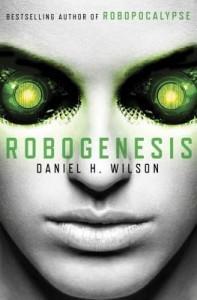Title: Robogenesis
Author: Daniel H. Wilson
ISBN: 978-0-385-53709-4
No. of Pages: 384
Genre: Science Fiction
Origins: Doubleday
Release Date: 10 June 2014
Bottom Line: Exciting and frightening with nonstop action
 Synopsis:
Synopsis:
“Humankind had triumphed over the machines. At the end of Robopocalypse, the modern world was largely devastated, humankind was pressed to the point of annihilation, and the earth was left in tatters . . . but the master artificial intelligence presence known as Archos had been killed.
In Robogenesis, we see that Archos has survived. Spread across the far reaches of the world, the machine code has fragmented into millions of pieces, hiding and regrouping. In a series of riveting narratives, Robogenesis explores the fates of characters new and old, robotic and human, as they fight to build a new world in the wake of a devastating war. Readers will bear witness as survivors find one another, form into groups, and react to a drastically different (and deadly) technological landscape. All the while, the remnants of Archos’s shattered intelligence are seeping deeper into new breeds of machines, mounting a war that will not allow for humans to win again.
Daniel H. Wilson makes a triumphant return to the apocalyptic world he created, for an action-filled, raucous, very smart thrill ride about humanity and technology pushed to the tipping point.”
Thoughts: There is nothing more frightening than an artificial intelligence becoming sentient and independent, which is why it is a common plotline in science fiction. Daniel H. Wilson explored this very idea in Robopocalypse, as Archos did its best to destroy humankind in its original form. However, as Robogenesis quickly suggests, there are indeed worse things than a cognizant machine.
Just as in the first novel, the story bounces from character to character; readers see what happened to them at the end of the war and what continues to happen to them under this new threat. All of the main players are back, although the forms they take may be completely unexpected. Roles shift, among humans as well as machines, and everything learned during the war must be unlearned as the new threat changes the playing field yet again.
While most horror is best left to one’s imagination, Mr. Wilson’s descriptions of the damage Rob’s machines can and did do to humans are the exception to this rule. True, the descriptions are brutal and bloody and horrifying by their general mayhem. However, there is a lack of emotion to such descriptions that befit the nature of the machines but is terrifying in its diffidence. This is the true repulsion behind any sort of battle against technology. Machines can and will inflict the maximum amount of damage on humans and will do so without the messy influence of remorse or guilt.
Robogenesis explores an entirely new world in which machines are very much alive. They think, they rationalize, and in some instances, they even feel. One sees inklings of this in the first book, but it is in the sequel where Wilson explores in depth the idea of machine evolution. Of particular focus are the machine/human hybrids that were much of Archos’ focus in his experimentation. Their abilities prove to be a significant factor in the second war, and Wilson does a fantastic job of showing how the blend of human knowledge and technology could change humanity forever. It is simultaneously creepy and absolutely fascinating.
Robogenesis is an exciting and frightening continuation of the ultimate story of man versus machine. Wilson’s detailed descriptions and expert knowledge of robotics creates a thoroughly realistic and easily visualized story. The gruesome nature of the battle scenes and other human/robot interaction does make it a novel for the strong-of-stomach. However, gore aside, it is an intense exploration of possibilities and consequences. Nonstop action and the emotional powerhouse associated with the end of mankind makes Robogenesis a thrilling sequel; more importantly, its ending will leave readers gasping in surprise and anxious for the next installation in the story.
